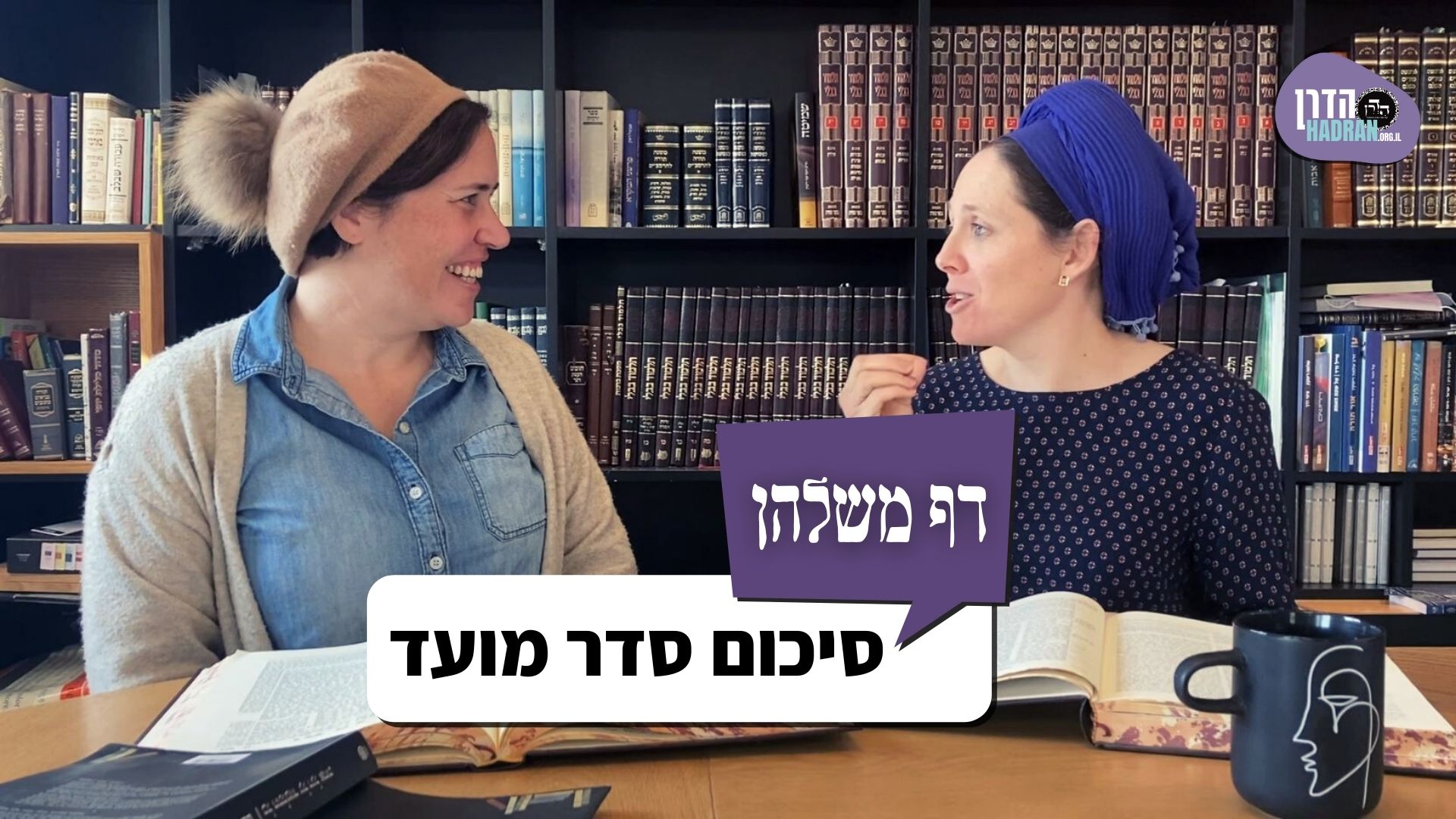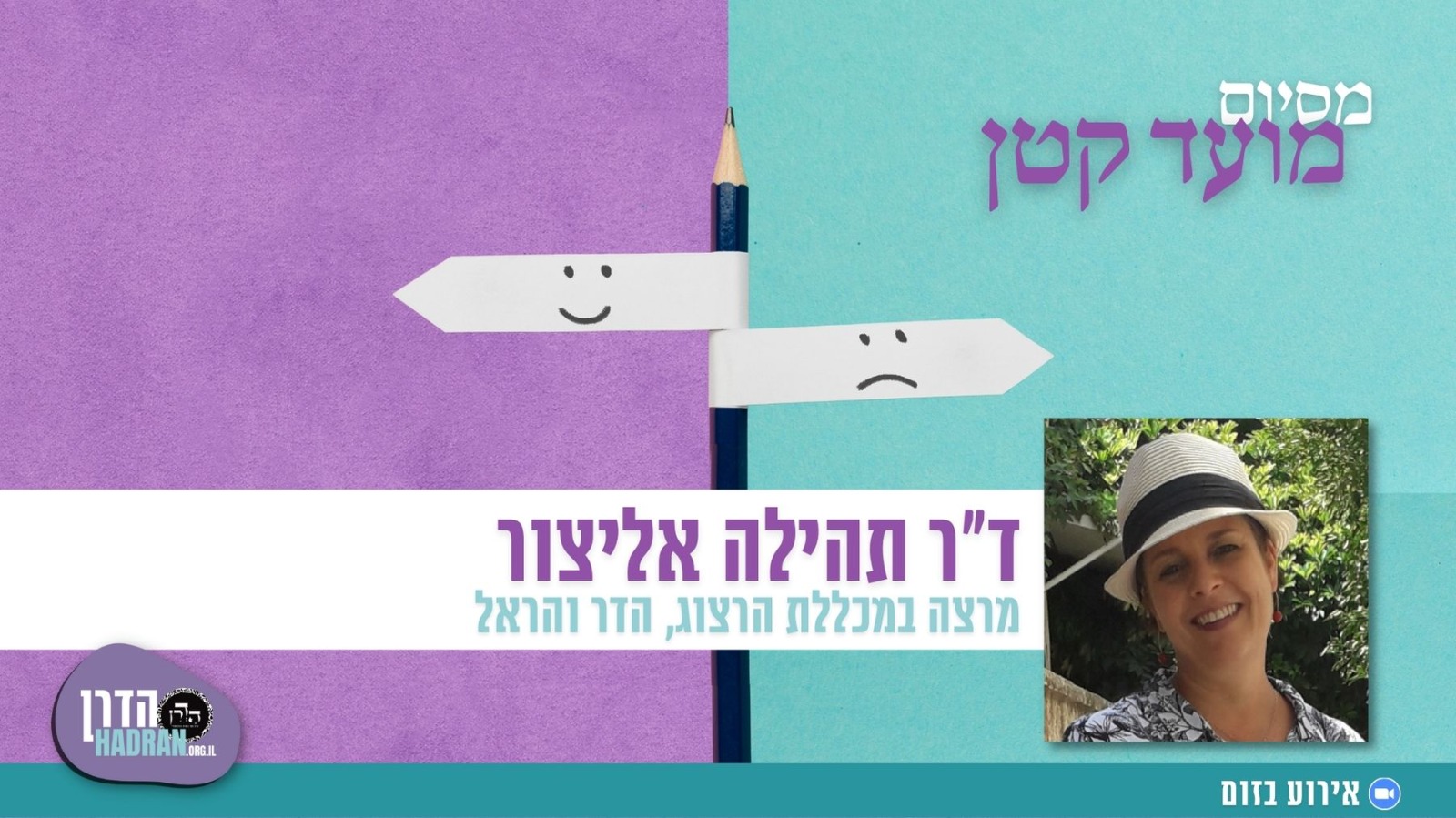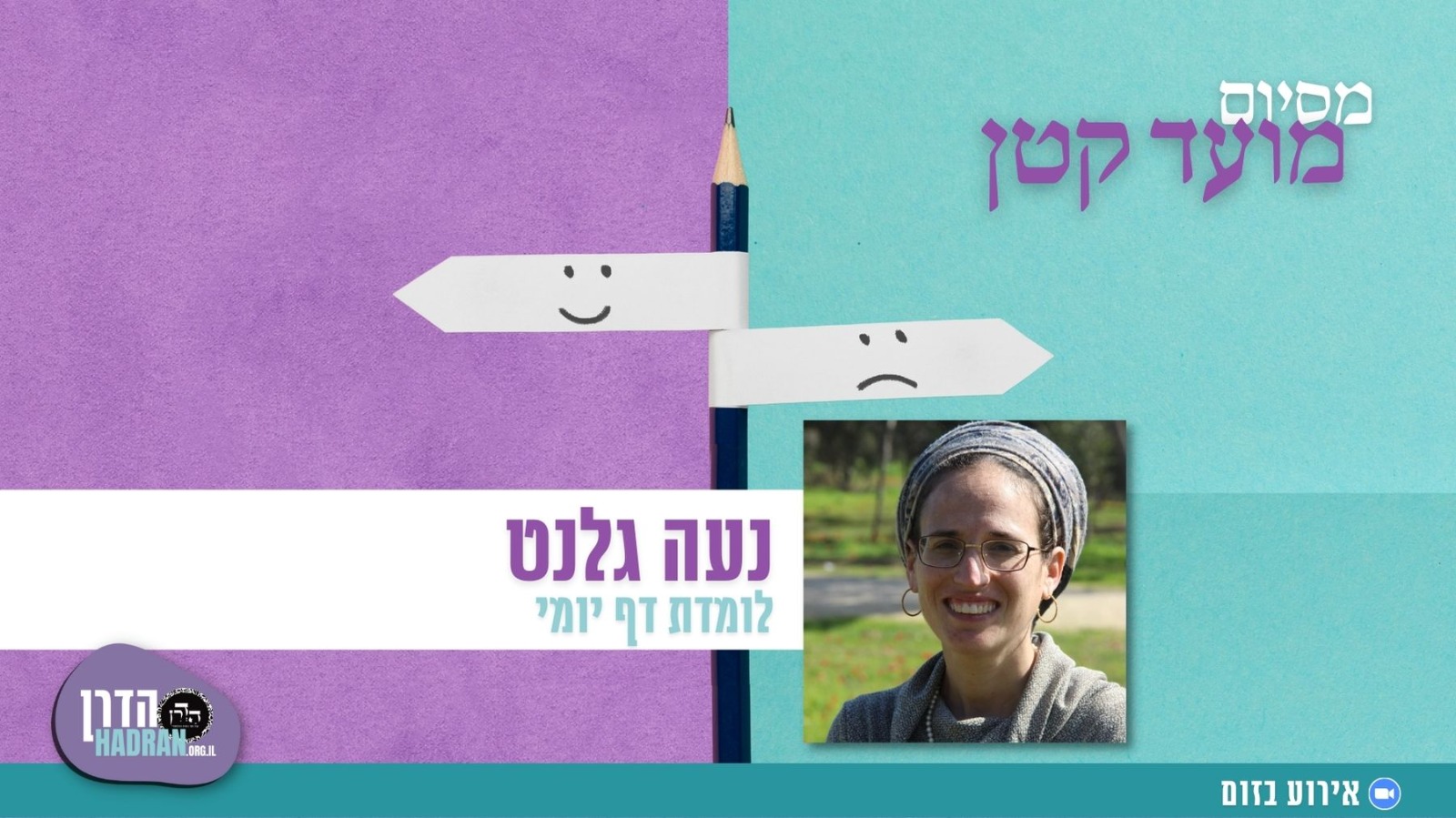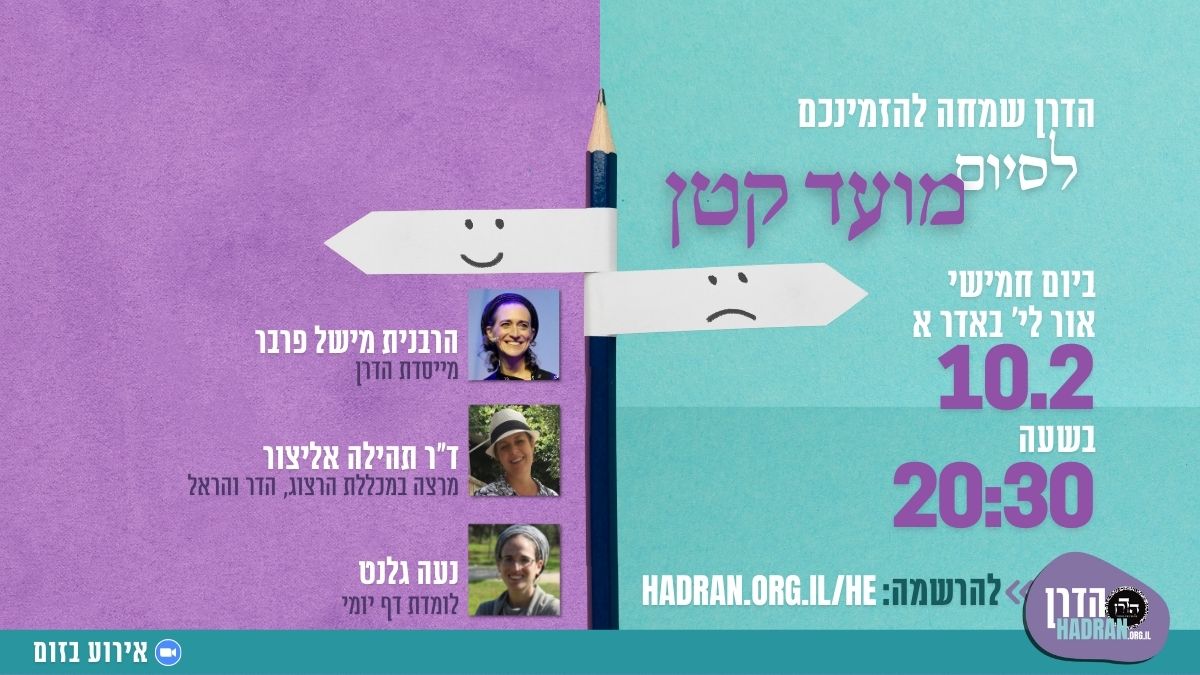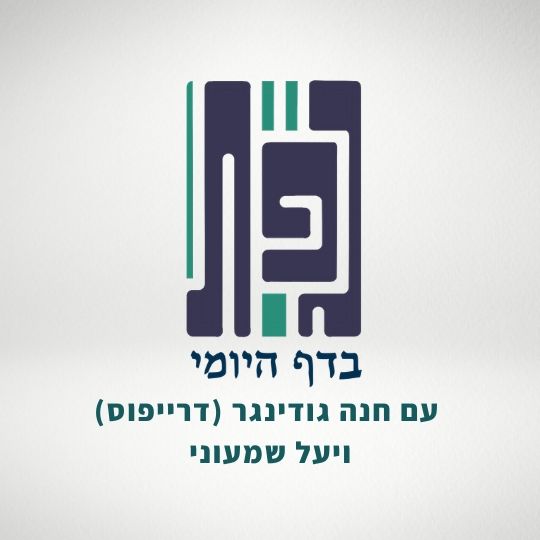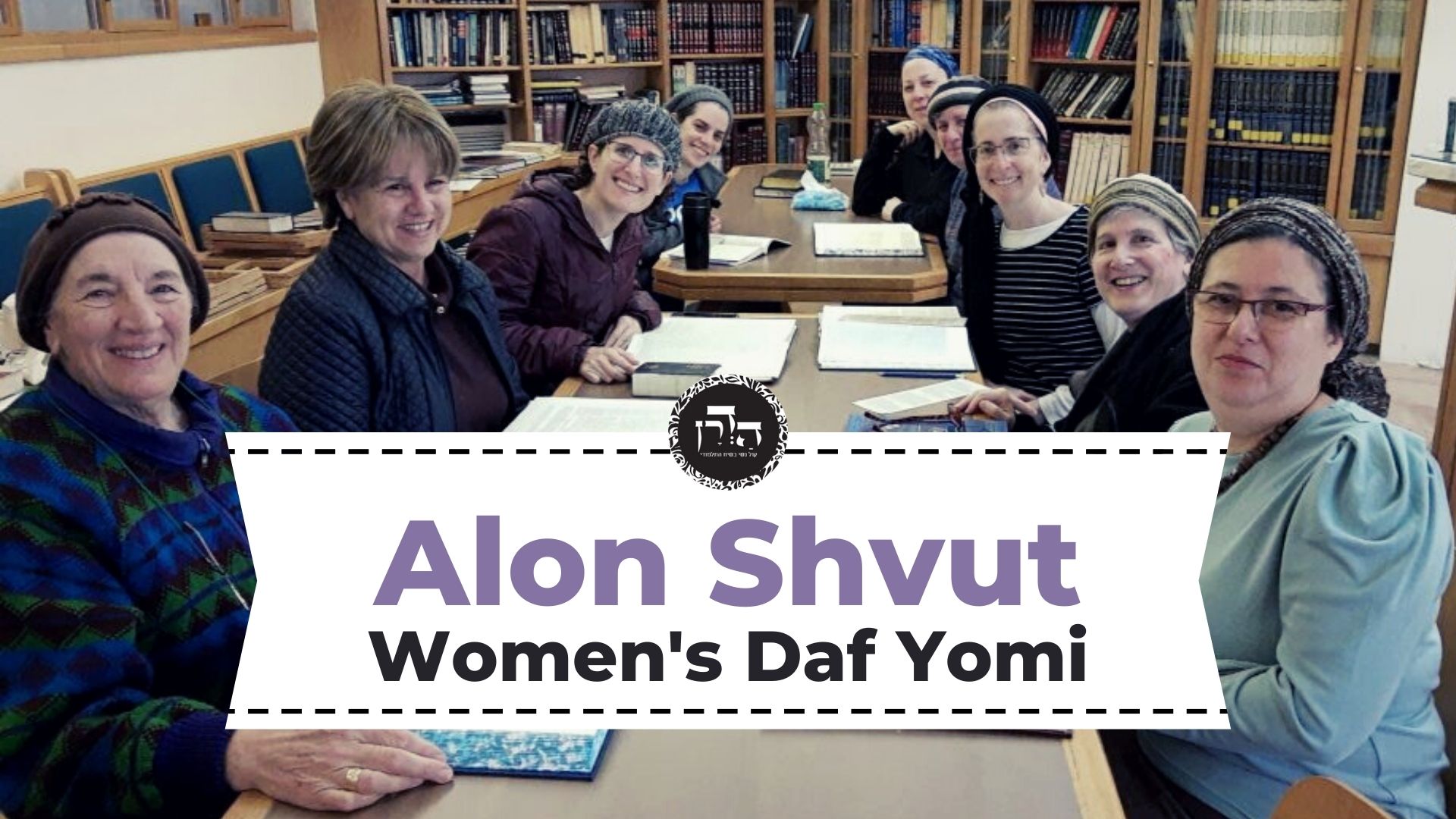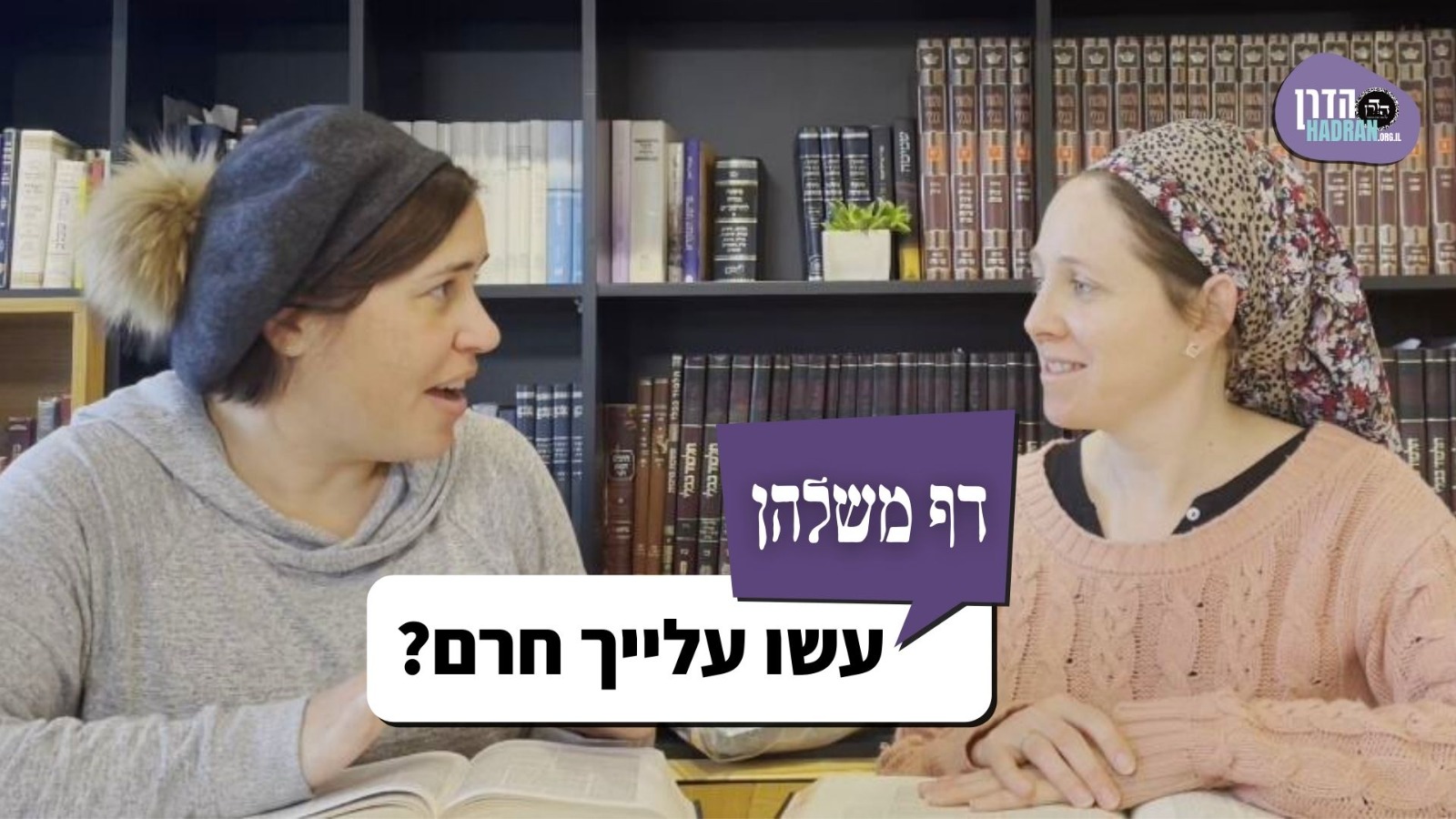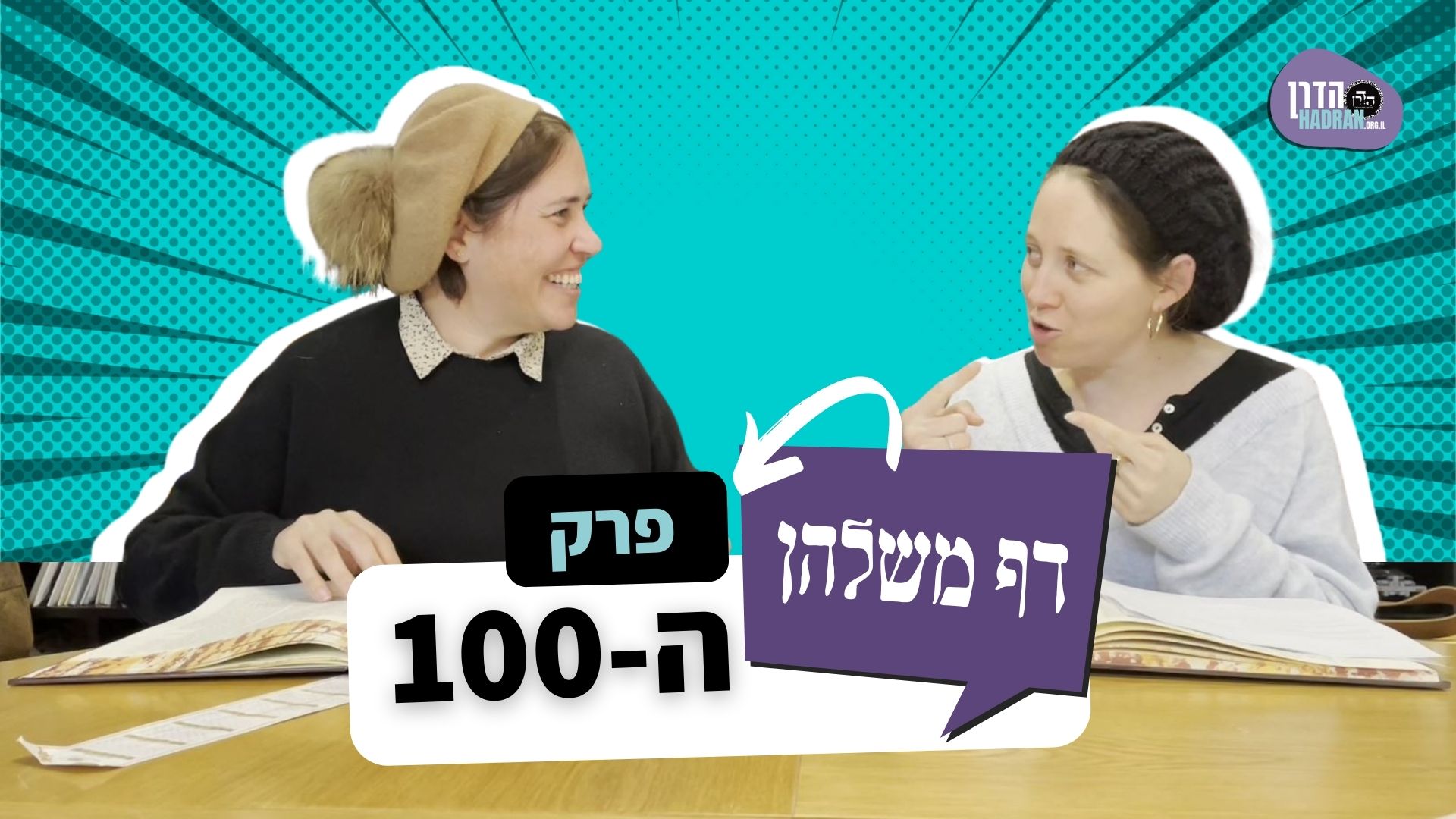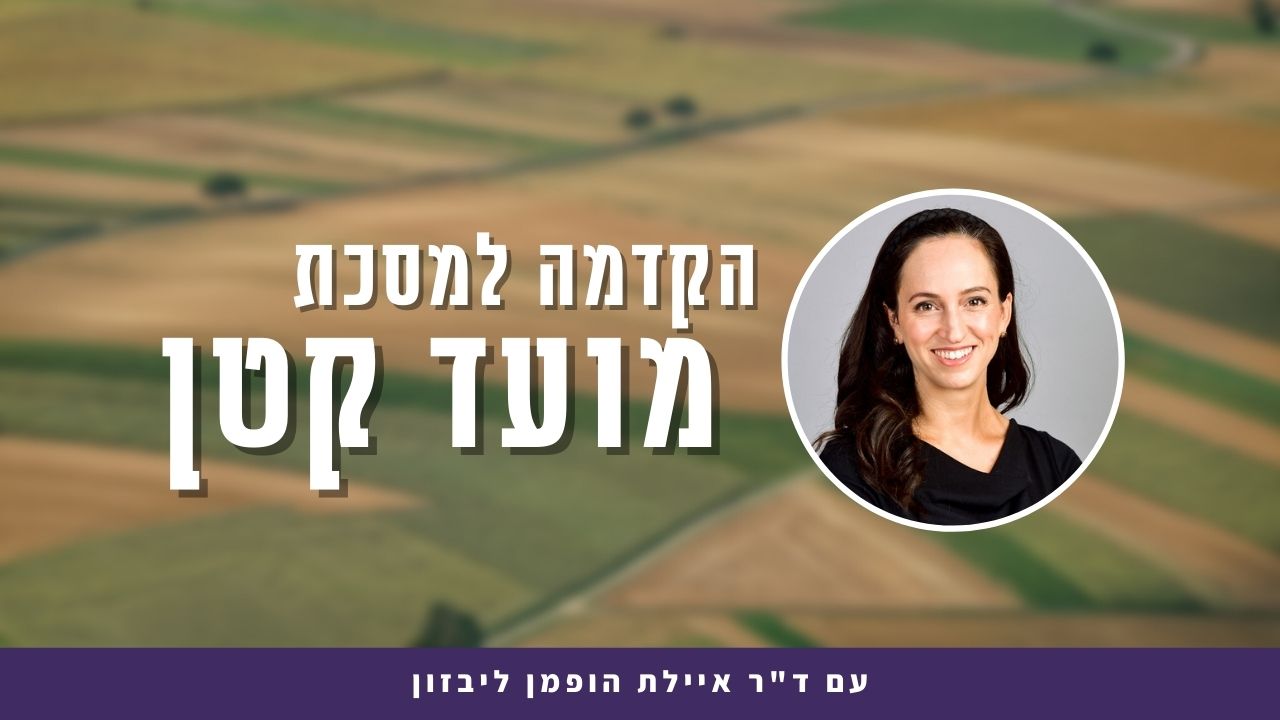מועד קטן יז
תַּלְמִיד שֶׁנִּידָּה לִכְבוֹדוֹ — נִדּוּיוֹ נִידּוּי, דְּתַנְיָא: מְנוּדֶּה לָרַב — מְנוּדֶּה לַתַּלְמִיד, מְנוּדֶּה לַתַּלְמִיד — אֵינוֹ מְנוּדֶּה לָרַב. לָרַב הוּא דְּאֵינוֹ מְנוּדֶּה, הָא לְכוּלֵּי עָלְמָא — מְנוּדֶּה.
If a student ostracized someone else due to an insult to his dignity, and not because the ostracized person was guilty of some transgression, his decree of ostracism is valid, as it is taught in a baraita: One who is ostracized by the teacher is considered ostracized with regard to the student. However, one who is ostracized by the student is not considered ostracized with regard to the teacher. The Gemara attempts to draw an inference from a careful reading of this baraita: He is not considered ostracized with regard to the teacher, which implies that he is considered ostracized with regard to everyone else.
לְמַאי? אִי בְּמִילֵּי דִשְׁמַיָּא — ״אֵין חׇכְמָה וְאֵין תְּבוּנָה וְאֵין עֵצָה לְנֶגֶד ה׳״! אֶלָּא לָאו, לִכְבוֹד עַצְמוֹ.
The Gemara clarifies the case: For what reason was he ostracized? If it was for a matter relating to Heaven, i.e., because he sinned, then why, if he was ostracized by the student, should he not be considered ostracized with regard to the teacher? Doesn’t the verse state: “There is no wisdom or understanding or counsel against the Lord” (Proverbs 21:30)? This means that when a sin is committed and God’s name is desecrated, all other considerations are ignored, even the eminence and knowledge of the teacher, and therefore he too must treat the offender as ostracized. Rather, is it not that the Gemara is referring to a case where the student ostracized the other person due to an insult to his own dignity? Therefore, it is apparent that his decree of ostracism is valid and binding upon all, with the exception of his teacher.
אָמַר רַב יוֹסֵף: צוּרְבָּא מֵרַבָּנַן עָבֵיד דִּינָא לְנַפְשֵׁיהּ בְּמִילְּתָא דִּפְסִיקָא לֵיהּ.
Rav Yosef said: A Torah scholar may execute judgment for himself with regard to a matter about which he is certain, and he is not required to first go to court and have the case decided for him. The same applies when another person behaves in a disrespectful manner toward him; he is permitted to go ahead on his own and ostracize him.
הָהוּא צוּרְבָּא מֵרַבָּנַן דַּהֲווֹ סְנוּ שׁוּמְעָנֵיהּ, אָמַר רַב יְהוּדָה: הֵיכִי לֶיעְבֵּיד? לְשַׁמְּתֵיהּ — צְרִיכִי לֵיהּ רַבָּנַן, לָא לְשַׁמְּתֵיהּ — קָא מִיתְּחִיל שְׁמָא דִשְׁמַיָּא.
There was a certain Torah scholar who gained a bad reputation due to rumors about his conduct. Rav Yehuda said: What should be done? To excommunicate him is not an option. The Sages need him, as he is a great Torah authority. Not to excommunicate him is also not an option, as then the name of Heaven would be desecrated.
אֲמַר לֵיהּ לְרַבָּה בַּר בַּר חָנָה: מִידֵּי שְׁמִיעַ לָךְ בְּהָא? אֲמַר לֵיהּ, הָכִי אָמַר רַבִּי יוֹחָנָן: מַאי דִּכְתִיב: ״כִּי שִׂפְתֵי כֹהֵן יִשְׁמְרוּ דַעַת וְתוֹרָה יְבַקְשׁוּ מִפִּיהוּ כִּי מַלְאַךְ ה׳ צְבָאוֹת הוּא״. אִם דּוֹמֶה הָרַב לְמַלְאַךְ ה׳ — יְבַקְּשׁוּ תּוֹרָה מִפִּיו, וְאִם לָאו — אַל יְבַקְּשׁוּ תּוֹרָה מִפִּיו.
Rav Yehuda said to Rabba bar bar Ḥana: Have you heard anything with regard to this issue? He said to him: Rabbi Yoḥanan said as follows: What is the meaning of that which is written: “For the priest’s lips should keep knowledge, and they should seek Torah at his mouth; for he is a messenger [malakh] of the Lord of hosts” (Malachi 2:7)? This verse teaches: If the teacher is similar to an angel [malakh] of the Lord, then seek Torah from his mouth, but if he is not pure and upright, then do not seek Torah from his mouth; even if he is knowledgeable about Torah, do not learn from him.
שַׁמְּתֵיהּ רַב יְהוּדָה. לְסוֹף אִיחֲלַשׁ רַב יְהוּדָה. אֲתוֹ רַבָּנַן לְשַׁיּוֹלֵי בֵּיהּ וַאֲתָא אִיהוּ נָמֵי בַּהֲדַיְיהוּ, כַּד חַזְיֵיהּ רַב יְהוּדָה, חַיֵּיךְ.
Based on this statement, Rav Yehuda ostracized that Torah scholar. In the end, after some time had passed, Rav Yehuda took ill and was on the verge of death. The Sages came to inquire about his well-being, and the ostracized scholar came along with them as well. When Rav Yehuda saw him, that scholar, he laughed.
אֲמַר לֵיהּ: לָא מִסָּתְיֵיהּ דְּשַׁמְּתֵיהּ לְהָהוּא גַּבְרָא, אֶלָּא אַחוֹכֵי נָמֵי חַיֵּיךְ בִּי?! אֲמַר לֵיהּ: לָאו בְּדִידָךְ מְחַיֵּיכְנָא, אֶלָּא דְּכִי אָזֵילְנָא לְהָהוּא עָלְמָא בְּדִיחָא דַּעְתַּאי, דַּאֲפִילּוּ לְגַבְרָא כְּווֹתָךְ לָא חַנֵּיפִי לֵיהּ.
The ostracized scholar said to him: Was it not enough that you excommunicated that man, i.e., me, but now you even laugh at me? Rav Yehuda said to him: I was not laughing at you; rather, I am happy as I go to that other world that I did not flatter even a great man like you, but instead I treated you fairly in accordance with the halakha.
נָח נַפְשֵׁיהּ דְּרַב יְהוּדָה. אֲתָא לְבֵי מִדְרְשָׁא, אֲמַר לְהוּ: שְׁרוֹ לִי! אֲמַרוּ לֵיהּ רַבָּנַן: גַּבְרָא דַּחֲשִׁיב כְּרַב יְהוּדָה לֵיכָּא הָכָא דְּלִישְׁרֵי לָךְ, אֶלָּא זִיל לְגַבֵּיהּ דְּרַבִּי יְהוּדָה נְשִׂיאָה דְּלִישְׁרֵי לָךְ. אֲזַל לְקַמֵּיהּ, אֲמַר לֵיהּ לְרַבִּי אַמֵּי: פּוֹק עַיֵּין בְּדִינֵיהּ, אִי מִיבְּעֵי לְמִישְׁרֵא לֵיהּ — שְׁרִי לֵיהּ.
Rav Yehuda died. The ostracized scholar came to the study hall and said to the Sages: Release me from the decree of ostracism. The Sages said to him: There is no man here as eminent as Rav Yehuda who can release you from the ostracism. Rather, go to Rabbi Yehuda Nesia in Eretz Yisrael, as only he can release you. That scholar came before Rabbi Yehuda Nesia. Rabbi Yehuda Nesia said to Rabbi Ami: Go and examine his case. If it is necessary to release him from his decree of ostracism, release him on my behalf.
עַיֵּין רַבִּי אַמֵּי בְּדִינֵיהּ, סְבַר לְמִישְׁרֵא לֵיהּ. עָמַד רַבִּי שְׁמוּאֵל בַּר נַחְמָנִי עַל רַגְלָיו וְאָמַר: וּמָה שִׁפְחָה שֶׁל בֵּית רַבִּי לֹא נָהֲגוּ חֲכָמִים קַלּוּת רֹאשׁ בְּנִידּוּיָהּ שָׁלֹשׁ שָׁנִים, יְהוּדָה חֲבֵירֵינוּ עַל אַחַת כַּמָּה וְכַמָּה.
Rabbi Ami examined his case and thought at first to release him from his ostracism. But Rabbi Shmuel bar Naḥmani rose up on his feet and said: If the maidservant in the house of Rabbi Yehuda HaNasi once ostracized another person, and the Sages did not relate frivolously to her decree of ostracism and did not revoke it until three years had passed, all the more so, with regard to a decree of ostracism placed by Yehuda our colleague, we must take it seriously and not release this scholar.
אֲמַר רַבִּי זֵירָא: מַאי דְּקַמַּן דַּאֲתָא הָאִידָּנָא הַאי סָבָא בְּבֵי מִדְרְשָׁא, דְּהָא כַּמָּה שְׁנֵי לָא אֲתָא, שְׁמַע מִינַּהּ לָא מִיבְּעֵי לְמִישְׁרֵא לֵיהּ. לָא שְׁרָא לֵיהּ, נְפַק כִּי קָא בָכֵי וְאָזֵיל,
Rabbi Zeira said: What caused this Elder, Rabbi Shmuel bar Naḥmani, to come before us in the study hall today though for many years he did not come, and now he comes precisely during this discussion. Learn from this that it is not necessary to release him from his decree of ostracism, as this combination of events is certainly not a coincidence. Rather, it should be viewed as an instructive sign from Heaven. Consequently, Rabbi Ami did not release him from the ostracism, and the ostracized scholar left in tears.
אֲתָא זִיבּוּרָא וְטַרְקֵיהּ אַאַמְּתֵיהּ וּשְׁכֵיב. עַיְּילוּהּ לִמְעָרְתָּא דַּחֲסִידֵי וְלָא קַיבְּלוּהּ, עַיְּילוּהּ לִמְעָרְתָּא דְּדַיָּינֵי וְקַיבְּלוּהּ.
A wasp came and stung the ostracized scholar on his penis and he died. Because he was a great Torah scholar, they took him into the caves in which the pious are interred in order to bury him there, but the caves did not accept him. A snake stood at the entrance of the caves and did not let them pass. They then took him into the caves of the judges, and they accepted him.
מַאי טַעְמָא? דַּעֲבַד כְּרַבִּי אִילְעַאי. דְּתַנְיָא, רַבִּי אִילְעַאי אוֹמֵר: אִם רוֹאֶה אָדָם שֶׁיִּצְרוֹ מִתְגַּבֵּר עָלָיו — יֵלֵךְ לְמָקוֹם שֶׁאֵין מַכִּירִין אוֹתוֹ, וְיִלְבַּשׁ שְׁחוֹרִים וְיִתְעַטֵּף שְׁחוֹרִים, וְיַעֲשֶׂה מַה שֶּׁלִּבּוֹ חָפֵץ, וְאַל יְחַלֵּל שֵׁם שָׁמַיִם בְּפַרְהֶסְיָא.
The Gemara asks: What is the reason that he was accepted there? The Gemara answers: Even though he sinned, he still acted in accordance with the opinion of Rabbi Ilai, as it is taught in a baraita: Rabbi Ilai says: If a person sees that his evil inclination is gaining control over him and he cannot overcome it, then he should go to a place where he is not known. He should wear black, and he should wrap his head in black, as if he were a mourner. Perhaps these changes will influence him, so that he not sin. Even if these actions do not help, he should at least do as his heart desires in private and not desecrate the name of Heaven in public. Although this person had sinned, he did so in private and in a manner that did not publicly desecrate God’s name, and therefore it was fitting that he be given an honorable burial.
שִׁפְחָה שֶׁל בֵּית רַבִּי מַאי הִיא? דְּאַמְּתָא דְבֵי רַבִּי חֲזֵיתֵיהּ לְהָהוּא גַּבְרָא דַּהֲוָה מָחֵי לִבְנוֹ גָּדוֹל, אֲמַרָה: לֶיהֱוֵי הָהוּא גַּבְרָא בְּשַׁמְתָּא, דְּקָעָבֵר מִשּׁוּם ״וְלִפְנֵי עִוֵּר לֹא תִתֵּן מִכְשׁוֹל״. דְּתַנְיָא: ״וְלִפְנֵי עִוֵּר לֹא תִתֵּן מִכְשׁוֹל״ — בְּמַכֶּה לִבְנוֹ גָּדוֹל הַכָּתוּב מְדַבֵּר.
The Gemara asks: What is the story mentioned by Rabbi Shmuel bar Naḥmani involving the maidservant in the house of Rabbi Yehuda HaNasi? It was related that the maidservant in Rabbi Yehuda HaNasi’s house saw a certain man who was striking his adult son. She said: Let that man be excommunicated, due to the fact that he has transgressed the injunction: “You shall not place a stumbling block before the blind” (Leviticus 19:14), as it is taught in a baraita that the verse states: “You shall not place a stumbling block before the blind,” and the verse speaks here of one who strikes his adult son, as the son is likely to become angry and strike his father back, thereby transgressing the severe prohibition against hitting one’s parent.
רֵישׁ לָקִישׁ הֲוָה מְנַטַּר פַּרְדֵּיסָא. אֲתָא הָהוּא גַּבְרָא וְקָאָכֵיל תְּאֵינֵי, רְמָא בֵּיהּ קָלָא וְלָא אַשְׁגַּח בֵּיהּ. אֲמַר: לֶיהֱוֵי הָהוּא גַּבְרָא בְּשַׁמְתָּא. אֲמַר לֵיהּ: אַדְּרַבָּה, לֶיהֱוֵי הָהוּא גַּבְרָא בְּשַׁמְתָּא, אִם מָמוֹן נִתְחַיַּיבְתִּי לְךָ, נִידּוּי מִי נִתְחַיַּיבְתִּי לָךְ?
Similarly, it was related that Reish Lakish was guarding an orchard for payment when a certain man came and ate some figs that were growing there. Reish Lakish raised his voice and yelled at him, but this man paid no attention to him and kept eating. Reish Lakish said: Let that man be in a state of excommunication. The man eating the figs said to him: On the contrary, let that man, i.e., Reish Lakish, be in a state of excommunication, for even if I have become liable to you for payment, as I have eaten of the figs without permission, have I become liable to you for excommunication? With that statement, the man left.
אֲתָא לְבֵי מִדְרְשָׁא, אֲמַרוּ לֵיהּ: שֶׁלּוֹ — נִידּוּי, שֶׁלְּךָ — אֵינוֹ נִידּוּי.
Reish Lakish went to the study hall to inquire about the halakha with regard to this man. The other Sages said to him: His decree of ostracism is valid, but your decree of ostracism is not. In other words, that man was correct and Reish Lakish should not have ostracized him in response to his actions.
וּמַאי תַּקַּנְתֵּיהּ? זִיל לְגַבֵּיהּ דְּלִישְׁרֵי לָךְ. לָא יָדַעְנָא לֵיהּ. אֲמַרוּ לֵיהּ: זִיל לְגַבֵּי נְשִׂיאָה דְּלִישְׁרֵי לָךְ, דְּתַנְיָא: נִידּוּהוּ וְאֵינוֹ יוֹדֵעַ מִי נִידָּהוּ, יֵלֵךְ אֵצֶל נָשִׂיא וְיַתִּיר לוֹ נִדּוּיוֹ.
Reish Lakish then asked: If so, what is the remedy for this decree of ostracism? The Sages answered him: Go to him so that he may release you from it. Reish Lakish replied: I do not know him. They said to him: Go then to the Nasi, so that he may release you from the ban, as it is taught in a baraita: If one was ostracized, but he does not know who ostracized him, he should go to the Nasi, and the Nasi may release him from his decree of ostracism.
אָמַר רַב הוּנָא, בְּאוּשָׁא הִתְקִינוּ: אַב בֵּית דִּין שֶׁסָּרַח — אֵין מְנַדִּין אוֹתוֹ, אֶלָּא אוֹמֵר לוֹ: ״הִכָּבֵד וְשֵׁב בְּבֵיתֶךָ״. חָזַר וְסָרַח — מְנַדִּין אוֹתוֹ, מִפְּנֵי חִילּוּל הַשֵּׁם.
The Gemara continues: Rav Huna said that in Usha it was enacted: If the president of the court sinned, he is not ostracized. Although this would be the appropriate punishment, he is not ostracized, so as not to cause a desecration of God’s name. Rather, they say to him the words of the verse: “Keep your honor and stay at home” (II Kings 14:10). That is to say, to preserve your dignity, it would be best if you were to stay at home, resign your position, and refrain from further public appearances. If he sins again, he is ostracized, due to the desecration of God’s name that would ensue were people to think that he was spared his rightful punishment due to his high position.
וּפְלִיגָא דְּרֵישׁ לָקִישׁ. דְּאָמַר רֵישׁ לָקִישׁ: תַּלְמִיד חָכָם שֶׁסָּרַח — אֵין מְנַדִּין אוֹתוֹ בְּפַרְהֶסְיָא, שֶׁנֶּאֱמַר: ״וְכָשַׁלְתָּ הַיּוֹם וְכָשַׁל גַּם נָבִיא עִמְּךָ לָיְלָה״ — כַּסֵּהוּ כַּלַּיְלָה.
The Gemara comments: This opinion disagrees with that of Reish Lakish, for Reish Lakish said: If a Torah scholar sins, he is not ostracized at all in public, as it is stated: “Therefore, shall you fall in the day, and the prophet also shall fall with you in the night” (Hosea 4:5). This is explained to mean: If a prophet or any other important person sins, his offense should be concealed like the night and not punished in public.
מָר זוּטְרָא חֲסִידָא, כִּי מִיחַיַּיב צוּרְבָּא מֵרַבָּנַן שַׁמְתָּא, בְּרֵישָׁא מְשַׁמֵּית נַפְשֵׁיהּ, וַהֲדַר מְשַׁמֵּית לְדִידֵיהּ. כִּי הֲוָה עָיֵיל בְּאוּשְׁפִּיזֵיהּ שָׁרֵי לֵיהּ לְנַפְשֵׁיהּ, וַהֲדַר שָׁרֵי לֵיהּ לְדִידֵיהּ.
With regard to this issue, it was related that when a Torah scholar would become liable to be punished with excommunication before Mar Zutra the Pious, Mar Zutra would first excommunicate himself as a mark of respect for the Torah scholar, and afterward he would ostracize the Torah scholar. This self-imposed excommunication was meant only as a show of honor to the other Torah scholar, and therefore when Mar Zutra would enter his house of lodging, he would release his own excommunication, and afterward he would release the other’s excommunication.
אָמַר רַב גִּידֵּל אָמַר רַב: תַּלְמִיד חָכָם מְנַדֶּה לְעַצְמוֹ, וּמֵיפֵר לְעַצְמוֹ. אָמַר רַב פָּפָּא: תֵּיתֵי לִי, דְּלָא שַׁמֵּיתִי צוּרְבָּא מֵרַבָּנַן מֵעוֹלָם. אֶלָּא כִּי קָא מִיחַיַּיב צוּרְבָּא מֵרַבָּנַן שַׁמְתָּא, הֵיכִי עָבֵיד? כִּי הָא דִּבְמַעְרְבָא מִימְּנוּ אַנְּגָדָא דְּצוּרְבָּא מֵרַבָּנַן וְלָא מִימְּנוּ אַשַּׁמְתָּא.
Rav Giddel said that Rav said: A Torah scholar may ostracize himself, and he may similarly release himself from self-imposed ostracism. Rav Pappa said: I have good coming to me, for I am praiseworthy, as I have never ostracized a Torah scholar. The Gemara asks about this: If so, when a Torah scholar was liable to be ostracized, what would he do? The Gemara answers: He did as they do in the West, Eretz Yisrael, where they appoint a court to give a Torah scholar lashes, but they do not appoint a court to ostracize him. That is to say, lashes were preferred over ostracism.
מַאי שַׁמְתָּא? אָמַר רַב: שָׁם מִיתָה. וּשְׁמוּאֵל אָמַר: שְׁמָמָה יִהְיֶה, וּמַהְנְיָא בֵּיהּ כִּי טִיחְיָא בְּתַנּוּרָא.
The Gemara proceeds with a discussion that explains the severity of the punishment of excommunication: What is the meaning of the word excommunication [shamta]? Rav said: This word is a contraction of the expression there is death [sham mita], alluding to the deathly aspect of excommunication. And Shmuel said: Shamta means that he will be a desolation [shemama yiheyeh], and it is effective upon him like fat smeared on an oven. Just as some of the fat will always remain absorbed in the walls of the oven, so too some aspect of the curse contained in the excommunication will continue to adhere to him even after the excommunication has been nullified.
וּפְלִיגָא דְּרֵישׁ לָקִישׁ. דְּאָמַר רֵישׁ לָקִישׁ: כְּשֵׁם שֶׁנִּכְנֶסֶת בְּמָאתַיִם וְאַרְבָּעִים וּשְׁמוֹנָה אֵיבָרִים, כָּךְ כְּשֶׁהִיא יוֹצְאָה — יוֹצְאָה מִמָּאתַיִם וְאַרְבָּעִים וּשְׁמוֹנָה אֵיבָרִים.
The Gemara comments: And this opinion disagrees with the opinion of Reish Lakish, for Reish Lakish said: Just as ostracism enters the two hundred and forty-eight organs of one’s body when it is first pronounced, so too when it leaves, it leaves from his two hundred and forty-eight organs.
כְּשֶׁהִיא נִכְנֶסֶת, דִּכְתִיב: ״וְהָיְתָה הָעִיר חֵרֶם״ — ״חֵרֶם״ בְּגִימַטְרִיָּא מָאתַיִם וְאַרְבָּעִים וּשְׁמוֹנָה הָווּ. כְּשֶׁהִיא יוֹצְאָה, דִּכְתִיב: ״בְּרוֹגֶז רַחֵם תִּזְכּוֹר״, ״רַחֵם״ בְּגִימַטְרִיָּא הָכִי הָווּ.
The following allusion is offered in support of the opinion of Reish Lakish: When it enters, it enters all the organs, as it is written: “And the city shall be a curse [ḥerem]” (Joshua 6:17), and the numerical value [gimatriyya] of the word ḥerem, a concept similar to ostracism, is two hundred and forty-eight. Therefore, the verse alludes to the fact that a decree of ostracism penetrates one’s two hundred and forty-eight organs. When it leaves, it leaves all the organs, as it is written: “In wrath remember mercy [raḥem]” (Habakkuk 3:2), and the numerical value of the word raḥem is also two hundred and forty-eight, thereby teaching that when the decree of ostracism is revoked, it disappears entirely.
אָמַר רַב יוֹסֵף: שְׁדִי שַׁמְתָּא אַגְּנוּבְתָּא דְכַלְבָּא וְאִיהִי דִּידַהּ עָבְדָה. דְּהָהוּא כַּלְבָּא דַּהֲוָה אָכֵיל מְסָאנֵי דְרַבָּנַן וְלָא הֲווֹ קָא יָדְעִי מַנּוּ, וְשַׁמִּתוּ לֵיהּ. אִיתְּלַי בֵּיהּ נוּרָא בִּגְנוּבְתֵּיהּ וַאֲכַלְתֵּיהּ.
The Gemara continues discussing the power of a ban. Rav Yosef said: Cast an excommunication on the tail of a dog and it, the excommunication, will do its work and harm the dog. It was related that there was a certain dog that would eat the shoes of the Sages, and they did not know who it was causing this damage. They thought that it was a person, and so they excommunicated whoever was doing it. Soon thereafter, the dog’s tail caught fire and got burnt. This shows that excommunication can have a harmful effect even on a dog.
הָהוּא אַלָּמָא דַּהֲוָה קָא מְצַעַר לֵיהּ לְהָהוּא צוּרְבָּא מֵרַבָּנַן, אֲתָא לְקַמֵּיהּ דְּרַב יוֹסֵף, אֲמַר לֵיהּ: זִיל שַׁמְתֵּיהּ. אֲמַר לֵיהּ: מִסְתְּפֵינָא מִינֵּיהּ.
It was further related that there was a violent person who caused suffering to a certain Torah scholar. This Torah scholar came before Rav Yosef to ask what he should do. Rav Yosef said to him: Go and ostracize him. This Torah scholar said to him: I am afraid of him, that he will harass me even more.
אֲמַר לֵיהּ: שְׁקֵיל פְּתִיחָא עֲלֵיהּ. כׇּל שֶׁכֵּן דְּמִסְתְּפֵינָא מִינֵּיהּ. אֲמַר לֵיהּ: שִׁקְלֵיהּ, אַחֲתֵיהּ בְּכַדָּא,
Rav Yosef said to him: Take out, i.e., publish a written ostracism against him. The Torah scholar said to him: All the more so I am fearful of him, for if I publicize the matter he will certainly come after me. Rav Yosef said to him to do as follows: Take the written ostracism and place it in a jug,
וְאַחֲתֵיהּ בֵּי קִבְרֵי, וּקְרִי בֵּיהּ אַלְפָּא שִׁפּוּרֵי בְּאַרְבְּעִין יוֹמִין. אָזֵיל עָבֵיד הָכִי, פְּקַע כַּדָּא וּמִית אַלָּמָא. מַאי שִׁפּוּרֵי — שֶׁנִּפְרָעִין מִמֶּנּוּ.
and set it down in a cemetery, where nobody is found, and sound a thousand, i.e., many, shofar blasts over the course of forty days. That man went and did this. The jug burst and the violent man died. The Gemara asks: What is the reason that shofarot are sounded when a decree of ostracism is pronounced? The shofarot allude to the fact that they extract punishment [shenifra’in] from the excommunicated person.
מַאי תְּבָרָא? אָמַר רַב יִצְחָק בְּרֵיהּ דְּרַב יְהוּדָה: תָּבְרִי בָּתֵּי רָמֵי. דְּתַנְיָא, אָמַר רַבָּן שִׁמְעוֹן בֶּן גַּמְלִיאֵל: כׇּל מָקוֹם שֶׁ״נָּתְנוּ חֲכָמִים עֵינֵיהֶם״, אוֹ מִיתָה אוֹ עוֹנִי.
The Gemara asks further: What is the reason that broken blasts are sounded on the shofar when the excommunication is pronounced? Rav Yitzḥak, son of Rav Yehuda, said: It breaks tall buildings, i.e., a decree of ostracism can harm and break even the high and mighty, as it is taught in a baraita: Rabban Shimon ben Gamliel said: Wherever it says that the Sages set their eyes in anger upon a particular person, it causes either death or poverty.
וְהַנָּזִיר וְהַמְּצוֹרָע מִטּוּמְאָתוֹ לְטׇהֳרָתוֹ. בְּעָא מִינֵּיהּ רַבִּי יִרְמְיָה מֵרַבִּי זֵירָא: בְּשֶׁלֹּא הָיָה לָהֶם פְּנַאי, אוֹ דִלְמָא אַף בְּשֶׁהָיָה לָהֶם פְּנַאי?
§ It is taught in the mishna: And the nazirite whose term of naziriteship ended on the intermediate days of a Festival, and the leper who needs to purify himself on the intermediate days and must shave his entire body in order to leave his state of ritual impurity and regain his ritual purity, these people are permitted to cut their hair on the intermediate days of the Festival because they were not able to do so on the eve of the Festival. Rabbi Yirmeya raised a question before Rabbi Zeira: Is this allowance limited to the case where they did not have the time to cut their hair before the Festival, as it was prohibited for them to do so beforehand? Or perhaps they may cut their hair even in a case where they had the time to do so beforehand.
אֲמַר לֵיהּ, תְּנֵינָא: כׇּל אֵלּוּ שֶׁאָמְרוּ מוּתָּרִין לְגַלֵּחַ בַּמּוֹעֵד — בְּשֶׁלֹּא הָיָה לָהֶם פְּנַאי, אֲבָל הָיָה לָהֶם פְּנַאי — אֲסוּרִים.
He said to him: We already learned this in a baraita: With regard to all those about whom the Sages said that they are permitted to cut their hair on the intermediate days of a Festival, they may do so only if they did not have time to cut their hair before the Festival. But if they had time before the Festival began, then they are prohibited from doing so.
נָזִיר וּמְצוֹרָע, אַף עַל פִּי שֶׁהָיָה לָהֶם פְּנַאי — מוּתָּרִים, שֶׁלֹּא יְשַׁהוּ קׇרְבְּנוֹתֵיהֶן.
However, a nazirite and a leper, even if they had the time to do so before the Festival, they are permitted to cut their hair. Why are they granted this special allowance? So that they will not delay bringing their offerings. Both a nazirite and a leper must cut their hair before sacrificing their offerings in completion of their purification process. Therefore, if they are not permitted to cut their hair, they will not be able to sacrifice their offerings at the proper time.
תָּנָא: הַכֹּהֵן וְהָאָבֵל מוּתָּרִין בְּגִילּוּחַ. הַאי אָבֵל הֵיכִי דָמֵי? אִילֵּימָא שֶׁחָל שְׁמִינִי שֶׁלּוֹ בְּעֶרֶב הָרֶגֶל — אִיבְּעִי לֵיהּ לְגַלּוֹחֵי בָּעֶרֶב הָרֶגֶל! אֶלָּא, שֶׁחָל שְׁמִינִי שֶׁלּוֹ לִהְיוֹת בְּשַׁבָּת עֶרֶב הָרֶגֶל.
In was taught in a baraita: A priest and a mourner are permitted to cut their hair during the intermediate days of a Festival. The Gemara asks: What are the circumstances when the mourner is permitted to do so? If we say that the eighth day of his mourning occurred on the eve of the Festival, then he should have cut his hair on the eve of the Festival, as the more stringent restrictions of his mourning no longer applied. Rather, it must be that we are dealing with a case where the eighth day of his mourning occurred on a Shabbat that was the eve of the Festival, and so he could not have cut his hair on the Festival eve.
אִיבְּעִי לֵיהּ לְגַלּוֹחֵי עֶרֶב שַׁבָּת, דְּאָמַר רַב חִסְדָּא אָמַר רָבִינָא בַּר שֵׁילָא: הֲלָכָה כְּאַבָּא שָׁאוּל, וּמוֹדִים חֲכָמִים לְאַבָּא שָׁאוּל בְּשֶׁחָל שְׁמִינִי שֶׁלּוֹ לִהְיוֹת בְּשַׁבָּת עֶרֶב הָרֶגֶל שֶׁמּוּתָּר לְגַלֵּחַ בְּעֶרֶב שַׁבָּת!
But if this is the case, he should have cut his hair on Friday, for Rav Ḥisda said that Ravina bar Sheila said: The halakha is in accordance with the opinion of Abba Shaul. If the deceased was buried seven days before the Festival, then not only has the mourner completed the seven-day mourning period, but he is even regarded as having begun the thirty-day mourning period, and so the Festival cancels this thirty-day period of mourning. And the Rabbis concede to the opinion of Abba Shaul when the eighth day of his mourning occurs on a Shabbat that is the eve of the Festival, and they maintain that he is permitted to cut his hair on Friday. Since he is unavoidably prevented from cutting his hair on the eighth day, the Rabbis allowed him to cut it already on the seventh day.
לָא צְרִיכָא, שֶׁחָל שְׁבִיעִי שֶׁלּוֹ לִהְיוֹת בְּשַׁבָּת עֶרֶב הָרֶגֶל.
The Gemara answers: No, the ruling of the baraita is necessary in the case where the seventh day of his mourning occurs on a Shabbat that is the eve of the Festival. In that case, he certainly cannot cut his hair on Friday because it is only the sixth day of his mourning, and so he is permitted to cut his hair on the intermediate days of the Festival.
תַּנָּא בָּרָא סָבַר לַהּ כְּאַבָּא שָׁאוּל, דְּאָמַר: מִקְצָת הַיּוֹם כְּכוּלּוֹ, וְיוֹם שְׁבִיעִי עוֹלֶה לוֹ לְכָאן וּלְכָאן. וְכֵיוָן דְּשַׁבָּת הָוֵי — אָנוּס הוּא.
The Gemara comments: The tanna of the baraita, who permits a mourner to cut his hair during the intermediate days of the Festival, holds in accordance with the opinion of Abba Shaul, who said: The legal status of part of the day is like that of an entire day, and therefore the seventh day counts as both the final day of the seven-day mourning period and the first day of the thirty-day mourning period. From the perspective of the halakhot of mourning, one would be permitted to cut his hair; however since this day is Shabbat, he is unavoidably prevented from doing so, and therefore he is permitted to cut his hair during the intermediate days of the Festival.
תַּנָּא דִידַן סָבַר לַהּ כְּרַבָּנַן, דְּאָמְרִי: לָא אָמְרִינַן מִקְצָת הַיּוֹם כְּכוּלּוֹ, וְאַכַּתִּי לָא שְׁלִים אֲבֵילוּת דְּשִׁבְעָה.
The tanna of our mishna, on the other hand, who does not mention that a mourner is permitted to cut his hair on the intermediate days of a Festival, holds in accordance with the opinion of the Rabbis, who say: We do not say that the legal status of part of the day is like that of an entire day for a mourner. Therefore, he has not yet completed his seven-day period of mourning, and consequently he will not be permitted to cut his hair even after the Festival, until the completion of the thirty-day mourning period.
הַאי כֹּהֵן הֵיכִי דָּמֵי? אִילֵּימָא דִּשְׁלִים מִשְׁמַרְתּוֹ עֶרֶב הָרֶגֶל — אִיבְּעִי לֵיהּ לְגַלּוֹחֵי עֶרֶב הָרֶגֶל!
The Gemara continues and asks: The case of this priest, who is permitted to cut his hair during the intermediate days of a Festival, what are the circumstances? If we say that he completed his watch on the eve of the Festival, then he should have cut his hair on the eve of the Festival.
לָא צְרִיכָא, דִּשְׁלִים מִשְׁמַרְתּוֹ בָּרֶגֶל. תַּנָּא דִידַן סָבַר, כֵּיוָן דִּתְנַן: בִּשְׁלֹשָׁה פְּרָקִים בַּשָּׁנָה הָיוּ כׇּל הַמִּשְׁמָרוֹת שָׁווֹת, בְּאֵימוּרֵי הָרְגָלִים, וּבְחִילּוּק לֶחֶם הַפָּנִים — כְּמַאן דְּלָא שְׁלִים מִשְׁמַרְתּוֹ בָּרֶגֶל דָּמֵי. וְתַנָּא בָּרָא סָבַר: אַף עַל גַּב דְּשָׁיֵיךְ בְּהָנָךְ מִשְׁמָרוֹת, מִשְׁמַרְתֵּיהּ מִיהָא שְׁלִימָא לֵיהּ.
The Gemara answers: No, the ruling of the baraita is necessary in the case where one completed his watch during the Festival week itself. The tanna of our mishna holds that since we learned in a mishna (Sukka 55b): At the year, i.e., the three pilgrimage Festivals, all of the priestly watches share equally in the Festival offerings and in the division of the shewbread among the priests on Shabbat that occurs on the Festival, therefore, he is considered like one whose watch was not completed during the Festival, and he may not cut his hair until after the Festival. And the tanna of the baraita holds that although he belongs also to those other watches serving during the Festival, nevertheless, his own watch was completed before the Festival, and so he is permitted to cut his hair.
תָּנוּ רַבָּנַן: כׇּל אֵלּוּ שֶׁאָמְרוּ מוּתָּרִין לְגַלֵּחַ בַּמּוֹעֵד — מוּתָּרִין לְגַלֵּחַ בִּימֵי אֶבְלָן.
§ The Sages taught the following baraita: All those about whom it was said that they are permitted to cut their hair on the intermediate days of a Festival because they were unable to do so beforehand, they may similarly cut their hair during the period of their mourning if they had been unable to do so beforehand.
וְהָתַנְיָא: אֲסוּרִים! אָמַר רַב חִסְדָּא אָמַר רַב שֵׁילָא: כִּי תַּנְיָא הָכָא מוּתָּרִין — בְּשֶׁתְּכָפוּהוּ אֲבָלָיו.
The Gemara asks: But isn’t it taught in another baraita: They are nevertheless prohibited from cutting their hair during the period of their mourning? Rav Ḥisda said that Rav Sheila said: When it is taught in the baraita that they are permitted to cut their hair, it is referring to one for whom two periods of mourning applied in succession. In other words, this person was required to practice one period of mourning immediately following another period of mourning, and he is unable to endure the prescribed restrictions for such an extended period.
אִי בְּשֶׁתְּכָפוּהוּ אֲבָלָיו, מַאי אִירְיָא כׇּל אֵלּוּ שֶׁאָמְרוּ, אֲפִילּוּ כּוּלֵּי עָלְמָא נָמֵי? דְּתַנְיָא: תְּכָפוּהוּ אֲבָלָיו זֶה אַחַר זֶה, הִכְבִּיד שְׂעָרוֹ — מֵיקֵל בְּתַעַר, וּמְכַבֵּס כְּסוּתוֹ בְּמַיִם.
The Gemara asks: If this is referring to a case where his mourning applied in succession, then why specifically does the baraita discuss all those about whom it was said that they may cut their hair? The allowance should apply even to everyone, not only to those who had been unavoidably prevented from cutting their hair in the preceding period, as it is taught in a baraita: If one’s mourning periods applied in succession, one after the other, and his hair grew long and became heavy, he may lighten it by cutting his hair with a razor, and he may wash his garment in water, so that he does not suffer for such a long time without cutting his hair or washing his clothes.
הָא אִתְּמַר עֲלַהּ, אָמַר רַב חִסְדָּא: בְּתַעַר וְלֹא בְּמִסְפָּרַיִם, בְּמַיִם וְלֹא בְּנֶתֶר וְלֹא בְּאָהָל. אָמַר רַב חִסְדָּא: זֹאת אוֹמֶרֶת אָבֵל אָסוּר בְּתִכְבּוֹסֶת.
The Gemara answers: But wasn’t it said with regard to that baraita: Rav Ḥisda said: When it states that one may cut his hair, it means that he may do so with a razor, but not with scissors? Similarly, when it states that one may wash his clothes, it means that he may launder them with water, but not with neter or soap. Therefore, the baraita teaches that if one had been unavoidably prevented from performing these actions beforehand and then had to observe a double mourning period, he may cut his hair in an ordinary manner, without performing these actions in an altered way. Rav Ḥisda said: That is to say that, generally speaking, a mourner is prohibited from laundering his clothes.
תָּנוּ רַבָּנַן: כְּשֵׁם שֶׁאָמְרוּ אָסוּר לְגַלֵּחַ בַּמּוֹעֵד, כָּךְ אָסוּר לִיטּוֹל צִפּוֹרְנַיִם בַּמּוֹעֵד, דִּבְרֵי רַבִּי יְהוּדָה. וְרַבִּי יוֹסֵי מַתִּיר.
The Sages taught the following baraita: Just as the Sages said that it is prohibited to cut one’s hair during the intermediate days of a Festival, so too it is prohibited to cut one’s nails during the intermediate days of a Festival; this is the statement of Rabbi Yehuda, whereas Rabbi Yosei permits cutting nails.
וּכְשֵׁם שֶׁאָמְרוּ אָבֵל אָסוּר לְגַלֵּחַ בִּימֵי אֶבְלוֹ — כָּךְ אָסוּר לִיטּוֹל צִפּוֹרְנַיִם בִּימֵי אֶבְלוֹ, דִּבְרֵי רַבִּי יְהוּדָה. וְרַבִּי יוֹסֵי מַתִּיר.
And just as the Sages said that a mourner is prohibited from cutting his hair during the period of his mourning, so too he is prohibited from cutting his nails during the period of his mourning; this is the statement of Rabbi Yehuda, whereas Rabbi Yosei permits a mourner to cut his nails.
אָמַר עוּלָּא: הֲלָכָה כְּרַבִּי יְהוּדָה בְּאֵבֶל, וַהֲלָכָה כְּרַבִּי יוֹסֵי בַּמּוֹעֵד. שְׁמוּאֵל אָמַר:
Ulla said: The halakha is in accordance with the opinion of Rabbi Yehuda with regard to mourning, but the halakha is in accordance with the opinion of Rabbi Yosei with regard to the intermediate days of the Festival. Shmuel said:

